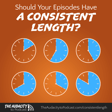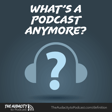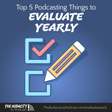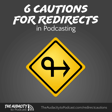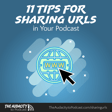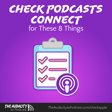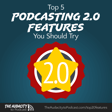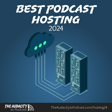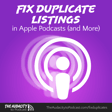
10 Tips for Streaming Live Shows - TAP236
Periscope, Blab, and Meerkat have brought fresh attention to live-streaming, even though similar technologies have existed for years. But live-streaming well requires a bit more work.
These tips will apply regardless of what technology you use—Periscope, Blab, Meerkat, YouTube Live, Google+ Hangouts on Air, or any other tool.
1. Have good reasons to go live
New tools like Blab and Periscope can seem like fun toys, but remember that they're only tools. As such, they may enable or simplify your ability to connect with people in a particular way.
Before you jump into live-streaming, have some good reasons to do so. Here are some examples.
- Offer live interaction.
- Host an event immediately following a timed event.
- Hold yourself accountable to produce new content by a specific time.
- Give your audience a place to interact with each other around your content.
2. Become a better host
A tool is only as good as the one using it. Many live-streaming tools allow almost anyone to reach an audience in real time. But live-streaming requires a whole new level of hosting skills you wouldn't normally exercising in offline recording.
- Multitasking
- Moderating
- Avoiding distractions
- Presenting clearly the first time
- And more
If you watch live-streams, you'll often see poor hosting skills—people talking over each other, derailing the conversation, not having any structure, and more.
Yes, this stuff happens in normal conversations. But live-streaming technologies can make this kind of experience worse due to half-duplexing (one person's audio cancels out someone else's), lack of physical sound direction (voices are mixed between left and right), and more.
3. Focus on your content
Most likely, you're live-streaming to share a message or participate in a conversation. Thus, don't get distracted by the live-streaming tool.
On social live-streaming platforms (like Blab, Periscope, and Meerkat), viewers can provide real-time feedback with comments or simple reactions (hearts, likes, props, etc.). It's okay to acknowledge that, but don't let it distract you from the content you're there to share.
During your recording, it's also important to smoothly excuse or work through live problems. It can be easy to start talking about the production instead of the message.
4. Speak to your primary audience
As much as the latest social-media tools often seem to be the Internet's newest crush, it's likely that the live viewers still represent a very small portion of your live audience.
If you live-stream while recording your podcast, most of your audience will not see the chat, the reactions, or maybe not even see what you're showing in the video.
Because of this, you may need to describe visual things instead of merely showing them. Also, focusing too much on your smaller live audience can significantly alienate your time-shifted audience.
5. Learn how to use the right tools
Blab, Periscope, Meerkat, YouTube Live (with or without Google+ Hangouts on Air), and whatever other live-streaming tools come out all have something unique and might have some technology quirks. It could be video orientation, the proper way to connect your mic and camera, the flow and display of comments, or anything else.
It's also important to know which tool is the right tool for you, your show, and your audience. If you don't have a good Internet connection, live video is probably not right for you. If you don't need audience interaction for your show, the live-streaming might not be for you. Or if your audience isn't tech-savvy, then you might need to use something simpler.
6. Include your live audience intentionally
Some live-streaming platforms focus more o
